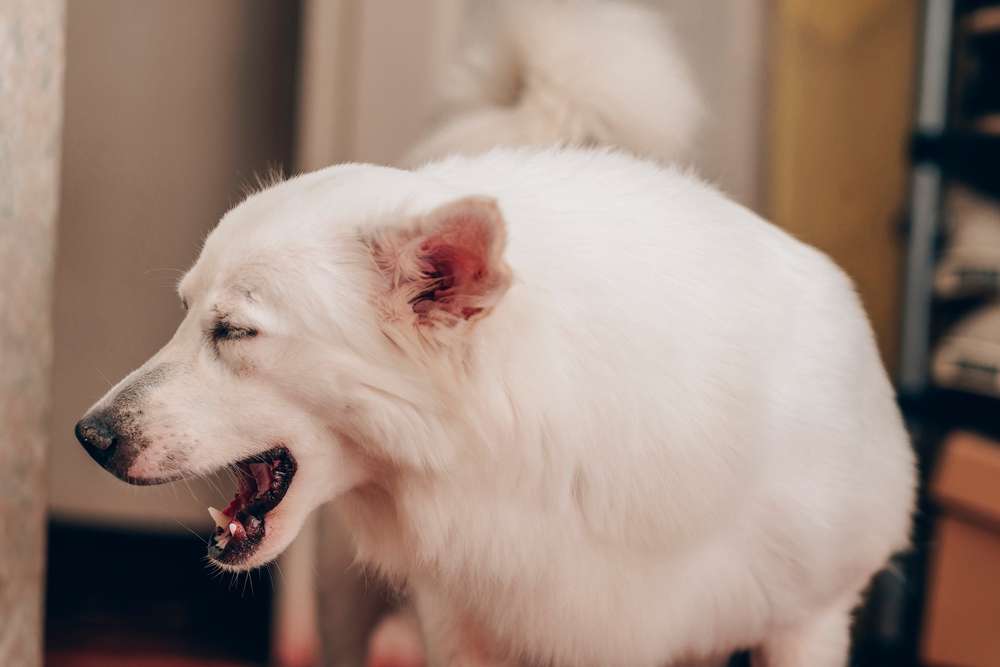Why Is My Dog Coughing and Gagging?

All featured products are chosen at the discretion of the GreatPetCare editorial team and do not reflect a direct endorsement by the author or reviewer.
A dog coughing and gagging can definitely be alarming for the pet parent, not to mention uncomfortable for the pet. Some causes will resolve on their own while others may require veterinary care.
Find out what causes coughing and gagging in dogs and what you should do if you’re noticing this concerning symptom in your dog.
Dog Cough vs Gag: What’s the Difference?
Both coughing and gagging are actions performed to clear the airway. Coughing is aimed at clearing irritants, phlegm, or other materials from the lungs, bronchi, or windpipe (trachea). Gagging is an attempt to clear an object in the throat, often to keep it from going down the windpipe. These reflexes can also be triggered by swelling (inflammation) or external pressure on the airway, such as an enlarged heart pressing on airways in the chest or a collar putting pressure on a dog’s neck when they pull at the leash.
A gag usually sounds like a retch, almost like your dog is going to vomit, but you won’t notice the abdominal heaving you’d see with puking. When gagging, the dog may spit up a little mucus. However, it’s also common for your dog to gag but have nothing come up. Sometimes, they will lick their lips or swallow after gagging, especially if they manage to dislodge the object or fluid that made them gag.
Coughs can sound dry, wet, honking, or hacking. You’ll see forceful expulsion of air from the lungs, which is aimed at dislodging the perceived irritant. Your dog may cough up phlegm, white foamy liquid, or even blood. It’s also common for a dog to cough without producing any liquid.
Coughing and gagging can occur together or separately in dogs. If your dog is doing both together, you may notice that your dog has a dry cough and then gags or that your dog has a gagging cough. However, a dog can also cough without gagging or gag without coughing.
Dogs can make a variety of other sounds that may sound like gagging or coughing, such as retching or choking. Retching is the sound and movement of vomiting. With true retching, you will see abdominal effort, which means the abdomen will be contracting. If your dog is retching without producing any vomit, this may be an emergency. Nonproductive retching is a sign of gastric dilatation and volvulus (GDV).
When a dog is truly choking, the noise they will make is usually high-pitched and whistly because their airway is obstructed by the object in their windpipe, and very little air can pass through. Your dog may also act panicked. Choking is an emergency, so you’ll want to make sure you know what to do if your dog starts choking, including how to potentially dislodge an object and when to seek emergency veterinary attention.
Why Is My Dog Coughing and Gagging? 7 Potential Causes

If your dog keeps coughing and gagging, there must be an underlying medical reason. Learn about seven potential causes of gagging coughs in dogs — and how to help your pet.
Kennel Cough
Kennel cough, also known as infectious tracheobronchitis or canine infectious respiratory disease complex (CIRDC), is an extremely common cause of coughing and gagging in dogs. Dogs with this condition often have a repetitive, dry, honking cough followed by a gag. When they gag, they may produce mucus or phlegm. However, it is also possible for the cough to sound deeper and wet.
Puppies and unvaccinated dogs are more susceptible to kennel cough. Dogs may also have an increased risk if they’re boarded in a kennel, go to daycare, visit dog parks, go to the veterinary clinic, or otherwise socialize with other dogs outside their home. If your young dog or puppy keeps coughing and gagging but nothing comes out, kennel cough is a potential diagnosis the veterinarian will discuss with you.
Kennel cough is highly contagious but usually not serious. Rarely, kennel cough progresses to pneumonia.
In some cases of kennel cough, a simple cough suppressant may be recommended while your dog’s body fights the virus. Some cases of kennel cough will require antibiotics, often doxycycline. Many cases of kennel cough will resolve on their own, similar to the human cold.
Laryngeal Paralysis
Laryngeal paralysis is a neurological condition that usually affects older dogs. This condition develops when a dog experiences a slow degeneration of the recurrent laryngeal nerves, which send nerve signals to the larynx and allow it to open and close as the dog breathes. If a dog has laryngeal paralysis, their larynx doesn’t open completely when they breathe in, and they may have trouble protecting their airway when swallowing.
Dogs with laryngeal paralysis are more likely to inhale material they shouldn’t, leading to coughing and potentially aspiration pneumonia. They may also make gagging noises as they attempt to keep material from going into their trachea.
In a senior dog who is coughing and gagging, especially if the dog belongs to a predisposed breed like Labrador Retrievers, laryngeal paralysis is an important condition to rule out.
In many cases, treatment is not necessary. However, the veterinarian may recommend lifestyle changes (such as feeding upright) or surgery depending on the severity of your pet’s condition. If your dog develops aspiration pneumonia, hospitalization may be recommended for supplemental oxygen, antibiotics, intravenous fluids, and close monitoring.
Pneumonia
Pneumonia can occur due to infections or inhaled materials (aspiration pneumonia). Dogs with pneumonia usually have a deeper, wet cough. You may notice coughing, fatigue, poor appetite, or nasal discharge. Your dog may cough up fluid or mucus, which might lead to gagging. In severe cases, your dog may have difficulty breathing. If this occurs, you should seek emergency attention.
Pneumonia can get serious very quickly, so it’s important to keep close eyes on your pet. Other conditions that lead to coughing and gagging, like CIRD or laryngeal paralysis, can also lead to pneumonia.
Pneumonia treatment may include antibiotics or antifungals (depending on cause), intravenous fluids, supplemental oxygen, and pain medications. In some cases, your pet may need to be hospitalized.
Tracheal Collapse
Tracheal collapse is a condition in which the windpipe narrows as an animal ages. It’s more common in small dogs like Yorkshire Terriers or Chihuahuas. The dog may cough more often when they’re excited or exercising or when a collar is putting pressure on their throat. The cough is often described as a “goose honk” and may end in a gag.
Your veterinarian may recommend lifestyle changes to avoid complications from tracheal collapse. Cough suppressants, steroids, and/or bronchodilators may be prescribed. There are specialty surgeries for severe cases.
Heart Disease
Coughing and gagging can also be caused by heart disease or, when it progresses, congestive heart failure (CHF).
When a dog has heart disease, coughing usually occurs due to either pressure placed on the airways by the enlarged heart or the build-up of fluid in the lungs that occurs during CHF. When the coughing occurs due to pressure on the airways, the cough is usually dry. The cough will sound deep and wet when there is fluid in the lungs, and the dog may cough up foamy liquid. Coughing materials up sometimes results in a gag.
Heart disease should be a consideration in older dogs who are coughing and gagging, and it’s important to rule out if you’re noticing the dog coughing and gagging at night.
Your veterinarian may prescribe medications, such as Vetmedin (pimobendan), to slow the progression of heart disease into heart failure. If your dog has developed heart failure, there are medications that can help pull fluid from the lungs and improve heart function. With acute cases of CHF, hospitalization may be required until your dog’s symptoms are controlled.

Chronic Bronchitis
Bronchitis in dogs usually causes a hacking or honking dry cough. This condition is usually seen in middle-aged and older dogs.
With bronchitis, the airways are inflamed, which causes the dog to cough. In some cases, the dog may cough up sputum, which can result in a gagging sound. The cough may be worse when the dog wakes up and improve throughout the day.
Chronic bronchitis may be caused by allergies, damage from parasites (like heartworms), secondhand smoke, and other environmental factors.
Dogs with chronic bronchitis may be treated with steroids (e.g., prednisone) and/or bronchodilators (e.g., theophylline). You should also avoid exposing them to potential irritants, like secondhand smoke.
Foreign Object in Airway
Foreign objects, including both solids and liquids, can cause coughing and gagging. Your dog may gag if something almost goes down the wrong pipe. If it successfully goes down the wrong pipe, your dog may start coughing. This can progress to choking, which is an emergency.
If the veterinarian is not able to dislodge the foreign object in your dog’s airways, it is possible that a scope may be used, or surgery may be recommended.
Dog Coughing and Gagging: Other Signs to Watch Out For

Coughing and gagging in puppies is more likely to have an infectious cause, while coughing and gagging in vaccinated mature or senior dogs is more likely to have a chronic cause, like laryngeal paralysis or heart disease. If you’re noticing coughing in a vaccinated adult dog, especially if they haven’t recently been to a kennel, dog park, or other social space, it’s a good idea to contact your veterinarian for an evaluation. You should always contact a veterinarian if a puppy is coughing.
In a young adult dog, it is okay to monitor at home for the first 24 hours as long as there are no other symptoms. If coughing continues for more than 24 hours or worsens during that time, contact a veterinarian. You should also contact your veterinarian for an evaluation if you’re noticing discharge from the nose or eyes, any gastrointestinal signs, or decreased appetite.
The following could be signs that you need to seek emergency attention for your coughing and gagging dog:
- Coughing up fluid or blood
- Lethargy, weakness, or sudden collapse
- Bluish tint to the mucous membranes (e.g., gums, tongue, conjunctiva, genitals)
- Increased respiratory effort or difficulty breathing
- Neurologic signs, like twitching or seizures
Diagnosis and Treatment
After your veterinarian performs a physical exam, your veterinarian will recommend diagnostics to determine the cause of your dog’s coughing. The most common diagnostic performed for coughing and gagging is chest X-rays.
X-rays: X-rays could be useful for diagnosing all the conditions we’ve listed here. X-rays could show changes to the lungs or airways, foreign objects in the airways, and changes to the heart’s size and structure.
Ultrasound: Some veterinarians will use ultrasound to look at the lungs. Ultrasound can also be useful for looking at the structure of the heart (i.e., echocardiogram). These diagnostics are more likely to be performed by specialists.
Other diagnostics that may be recommended include heartworm testing, bloodwork, culture of the airway fluid, and rarely, CT or MRI. If laryngeal paralysis is suspected, the veterinarian will perform a sedated exam of your dog’s larynx so that they can watch the larynx move as the dog breathes.
Treatment depends on the underlying cause for a dog coughing or gagging. Examples of medications your veterinarian may prescribe include cough suppressants, antibiotics, antifungals, steroids, and bronchodilators. In some cases, hospitalization or surgery may be required.
If your dog has a chronic condition, such as congestive heart failure, ongoing management involves giving daily medications at home. Common heart medicines for dogs include Vetmedin (pimobendan) to help the heart contract more effectively, furosemide to reduce fluid build-up, and enalapril to dilate blood vessels and make it easier for the heart to pump blood.
How to Prevent Coughing and Gagging in Dogs

While you can’t always prevent every cause of coughing and gagging in dogs, there are steps you can take to protect your dog:
- Keep your dog up to date on their vaccinations, including the Bordetella, DAPPv, and canine influenza virus vaccines.
- Keep your dog on year-round parasite prevention. Some parasites, such as heartworms, may cause coughing or gagging.
- Don’t smoke inside the house with your dog.
- For dogs with tracheal collapse, use a chest harness rather than a collar around the neck.









